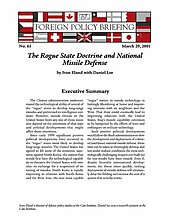Since early 1999 significant positive political developments have occurred in the “rogue” states most likely to develop long-range missiles. The United States has agreed to lift some of the economic sanctions against North Korea–the nation that would first have the technological capability to threaten the United States with missiles–in exchange for a suspension of its testing of missiles. North Korea is rapidly improving its relations with South Korea and the West. Iran–the next most capable “rogue” nation in missile technology–is haltingly liberalizing at home and improving relations with its neighbors and the West. That thaw could eventually lead to improving relations with the United States. Iraq’s missile capability continues to be hampered by the effects of wars and embargoes on military technology.
Such positive political developments would allow the Bush administration to slow the development and deployment of a limited land-based national missile defense. More time can be taken to thoroughly develop and test under realistic conditions the most technologically challenging weapon ever built (so far test results have been mixed). Even if, despite favorable international developments, the threat arises quickly, rushing deployment of missile defense will ultimately delay the fielding and increase the cost of a system that actually works.

